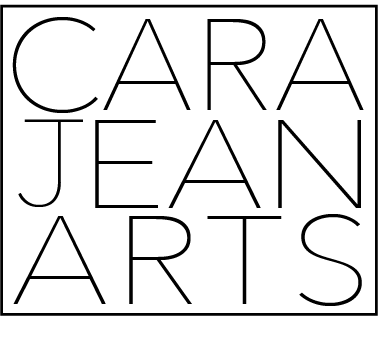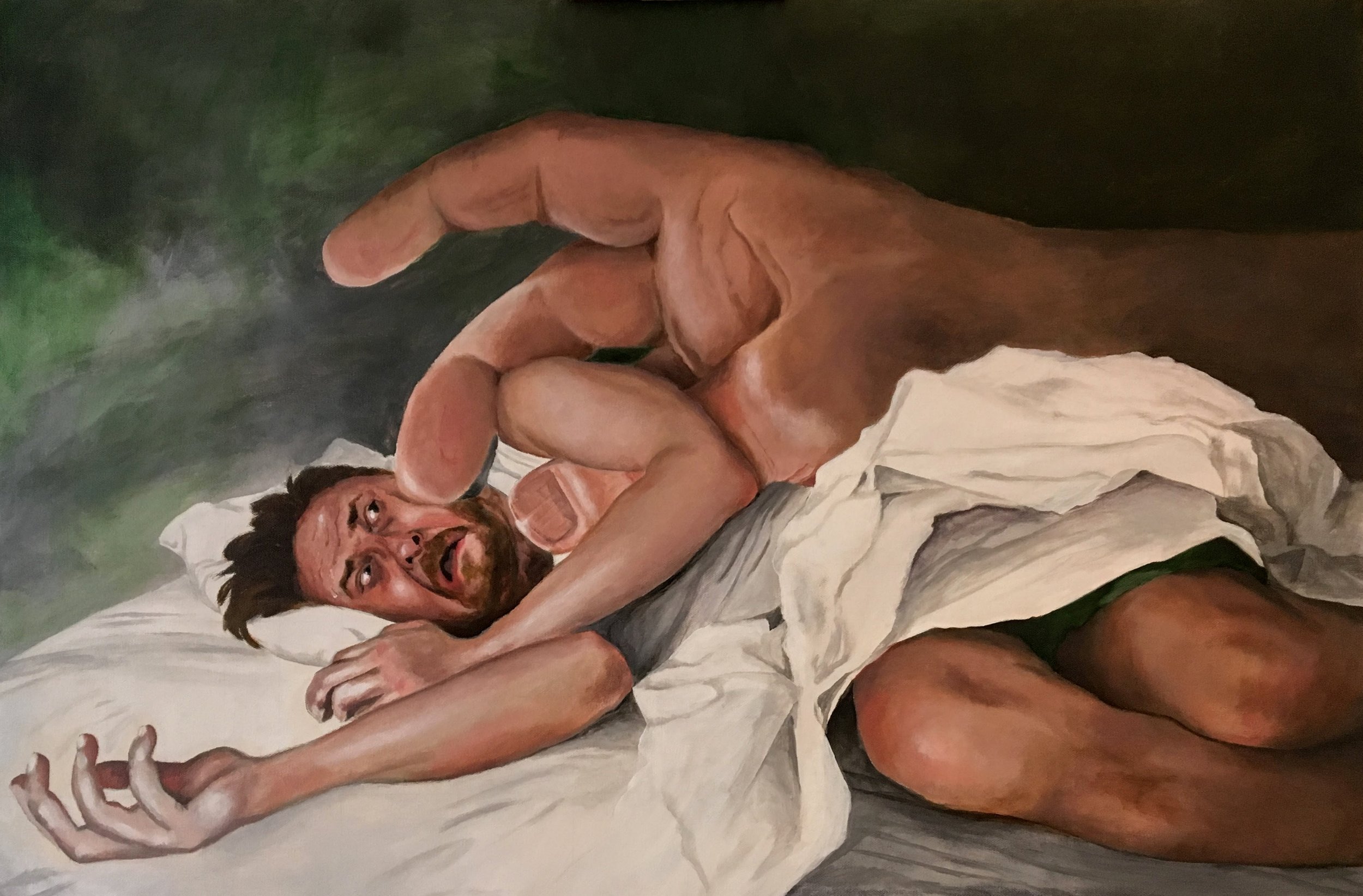The Advocate, 2018, Acrylic, 24 x 30
This is a reminder that if you don’t suffer personally from mental illness chances are you are close to someone who does. Being “the healthy one” is just as exhausting as being the one who is ill.
Q. If you are an active caregiver to someone with mental illness, what are you doing to ensure your own mental health and care?
Better Here, 2017, Acrylic, 30 x 40
It takes a lot of courage to talk openly about addiction- to accept that label. She wanted to represent how being high is so much more pleasant than the sober pain of a poorly treated mental illness. However, she also wanted to explain that while it was the only place she felt rest she was also constantly aware of the things in her life that she loved dearly but was neglecting. Addiction must be treated not as a choice, but as an illness that with proper care can be prevented.
Q. How does changing the perception from addiction is a choice to addiction is an illness affect the way we view and treat the person and the problem?
Heavy, Bleeding Heart, 2017, Acrylic, 36 x 36
When my father and grandmother passed away within months of each other, and I graduated from college and moved my family across the country all at the same time, I began to experience heart palpitations. They were coupled with irrational fear, lack of self confidence, blurred vision, histamine response, and a feeling of being pinned down. It took me six months to realize I was having panic attacks. This was the first time in all my years being married to someone with anxiety that I finally had a visceral understanding of what he goes through on a daily basis. This painting represents the weight of grief and empathy and is the antecedent to the entire series.
Q. How has empathy changed your relationship with those with mental illness, including yourself?
Coming and Going, 2018, Acrylic, 24 x 24
He expressed his frustration with a mental health care system that leaves him feeling like a money making device. Another person expressed that many times in her life she felt very negative repercussions to having reached out for help, including loss of rank and professional trustworthiness. It’s already quite difficult to muster the strength to ask for help with a mental illness but to feel betrayed and drained by the system that is supposed to help you is especially pernicious.
Q. What positive or negative outcomes have there been from seeking help with your mental health?
We Don’t Talk About Such Things, 2017, Acrylic, 24 x 30
When someone in passing says “Hi, how are you?” it’s not that they actually want to know- it’s that we’ve grown accustomed to using the phrase as a greeting rather than an opener for meaningful conversation. However, on the occasion that someone earnestly asks you that question, how are you accustomed to answer? How are you accustomed to listen? Nearly every person who participated in this series expressed their inability to speak openly about their illness. Some reasons were fear of losing professional credibility, shame from their family’s cultural belief systems, and loss of true identity due to labeling and stigma. Some simply lack the vocabulary to describe what goes on inside their minds to someone else. It’s time to talk! May we be just as capable of talking about mental health struggles as we are talking about the weather, car troubles, or physical nuisances.
Q. What questions and phrases can we use with one another to create more meaningful and honest conversation?
Put on a Happy Face, 2017, Acrylic, 24 x 30
Side effects from medications can often be just as bad, if not worse, than the mental illness itself. Her situation is particularly heartbreaking as she developed a severe case of Tardive Dyskinesia; a neurological syndrome that causes spastic and involuntary muscle movements, often caused by long-term use of medications used to treat psychiatric conditions. It began with swelling in her eyes that was so severe that she could no longer open them without assistance. It eventually caused involuntary spasms of her tongue and episodes where her legs would collapse. While trying lift her fog of depression she became nearly blind. It’s an unfortunate and sometimes cruel choice to make between tolerating mental illness or the side effects of medication. “Fake it ‘til you make it” or “just keep smiling” is idealistic advice, and in her case, “put on a happy face” is now literally impossible.
Q. How have you endured seemingly unbearable circumstances and how did it change you in the end?
Sabotage, 2017, Acrylic, 36 x 36
When we find workable solutions it isn’t uncommon to judge ourselves for needing help, exhaust ourselves by overthinking before we even gain purchase, or deny the help altogether. Medications are left unswallowed, support groups are left unattended, and we are instead caught in isolated banter with a duplicitous and tenacious opponent. Our fears, social anxieties, compulsive thoughts or behaviors, and physical side effects become disproportionate. We use phrases like “I’m fine” when others can sense that we truly aren’t. Mental illness distorts our view of reality and causes us to be our own worst enemies.
Q. In what ways are you your own worst enemy?
Strange Bedfellows, 2018, Acrylic, 24 x 36
Sleep disorder often accompanies not only Post-Traumatic Stress Disorder, but many other mental illnesses. He wanted to represent his difficulty
having long-lasting intimate partners because, in a sense, he already has one.
Q. What is keeping you from asking for help?
The Good Fight, 2017, Acrylic, 24 x 24
He is a drummer who performs nightly before an audience in his
professional life. In his personal life he is in a constant boxing match with and in his own mind. Many of us fight the daily battle of mental illness with our responsibilities, families, and communities for an audience.
Q. What healthy things, actions, or people keep you going on a daily basis and how do you remind yourself to hold on to those things?









